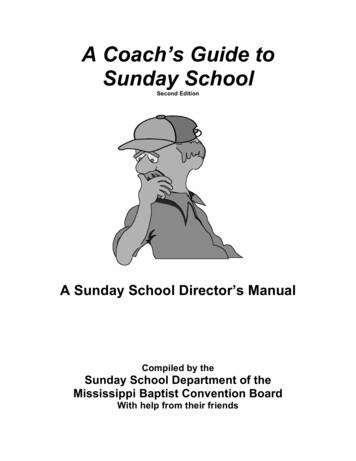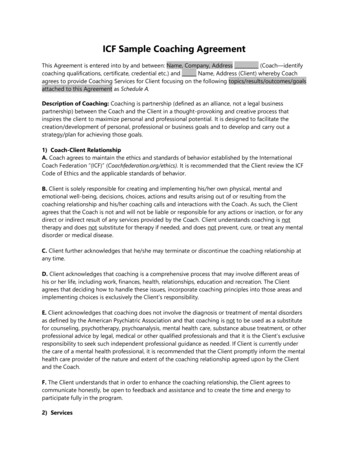
Transcription
A Coach’s Guide toSunday SchoolSecond EditionA Sunday School Director’s ManualCompiled by theSunday School Department of theMississippi Baptist Convention BoardWith help from their friends
DEDICATIONThis Second Editionof the Coach’sGuide is dedicatedto the memory ofDavid Wills, formerDirector of theSunday SchoolDepartment,Mississippi BaptistConvention Board,1998–2000.A Great TeamPlayer.To the past coacheswho have shown uswhat a winningSunday School cando to accomplish theGreat Commission –Arthur FlakeJ. N. BarnettA. V. WashburnHarry PilandAcknowledgmentsA Coach’s Guide to Sunday School, 2nd EditionCopyright 2003 by Mississippi Baptist Convention BoardBiblical quotations are from the Holy Bible, New InternationalVersion (NIV) copyright 1973, 1978, 1984, by International BibleSociety; the New American Standard Bible (NASB); the King JamesVersion (KJV).We must extend our thanks to those who have added their wit andwisdom to our understanding of Sunday School work. Some weknow and some we cannot even name at this time—they’ve shareda story, a cartoon, an insight to this resource.ABOUT THE AUTHORSKiely Young is Sunday School Director for the Mississippi BaptistConvention Board.Keith Wilkinson is Sunday School Director/Discipleship and Adult MinistrySpecialist for the Baptist General Convention of the Stateof Oklahoma.John Clendinning is General Administration Consultant, Sunday SchoolDepartment for the Mississippi Baptist Convention Board.Ben Atkinson Is the Minister of Married Adults and Outreach at TempleBaptist Church in Hattiesburg, Mississippi.Randy Tompkins is Director of Stewardship for the Louisiana BaptistConventionLarry Garner is Director of Church Services for the Metro BaptistAssociation serving the churches of the greater Jackson,Mississippi area.2
Table of ContentsPastor’s Clipboard . 4Introduction .7Session 1: VisionBy Keith Wilkinson .8Session 2: The TeamBy John Clendinning 14Session 3: OutreachBy Kiely Young .21Session 4: InreachBy Ben Atkinson .26Session 5: TeachingBy Randy Tompkins .34Session 6: New UnitsBy Larry Garner . 39Session 7: PlanningBy Kiely Young 52Session 8: Getting StartedBy John Clendinning .54In ConclusionBy Kiely Young .57Appendix 59Discovering/Enlisting Workers . .60Responsibilities of Workers . .62Great Sports Quotes . .693
Pastor’s ClipboardAlthough this manual is designed for a Sunday School Director, it is essential for you, thePastor, to be the driving force and the head Cheerleader in order to see your SundaySchool grow.You may be asking yourself, “Howdo I get all the pieces to fit?”You a l rea dy ha ve anorgani za ti on i n p lace tha t i sbest s ui ted for reach ing,teachin g, a nd a ssi mi la tingpeop le in to the ch u rch.IT IS YOUR SUNDAYSCHOOL4
THE SUNDAY SCHOOLWHAT IS SUNDAY SCHOOL?“Sunday School is the foundational strategy in a local church for leading peopleto faith in the Lord Jesus Christ, and for building on-mission Christians throughopen Bible study groups that engage people in evangelism, discipleship, ministry,fellowship, and worship.”Sunday School It is foundational. It can set the course of the church.It is a strategy. It takes work and planning.Its purposes are both an evangelism strategy and a discipling strategy.Open groups are developed to allow anyone to be enrolled.The functions of Sunday School are evangelism, discipleship, ministry,fellowship, and worship.WHAT IS THE ROLE OF THE PASTOR?The pastor is the primary leader of a Sunday School. Rarely will a Sunday School stay onits purpose without the visible, vital leadership of its pastor. The pastor and/or otherministers on the church staff are responsible for the overall direction of all of the church’sministries, including the Sunday School. The pastor works with the Sunday SchoolCouncil (Planning Team) to set goals and evaluate the Sunday School’s work inevangelism, discipleship, ministry, fellowship, and worship.RESPONSIBILITIES1.2.3.4.Provide overall leadership to the Sunday School Council (Planning Team)Lead the team in keeping the Sunday School focused on its purpose.Give vital and visible support to Sunday School and its leaders.Communicate the overall mission (purpose) and message of the Sunday School to theentire church.5. Guide team members toward spiritual maturity and assist them in developing skillsthat enhance their ability to fulfill their responsibilities.6. Set a positive example for others by living as an authentic witness of Christ andthrough full involvement in the life and ministry of the church.7. The pastor and other leaders will give frequent opportunities for members who arenot Christians to confess Christ publicly, and urge them to do so.5
“There is no substitute for a pastor with a vision for the church, the understanding thatthe Sunday School is the way to grow a church, and the commitment to give the timenecessary to help his staff do the work of the Sunday School.” — Jerry Squyres, inSecrets of Sunday School Success for Ministers of Education, Joe Haynes, compiler.Convention Press, 1992.Need Help? Contact your state Convention Sunday School Department to schedule aSunday School consultation, arrange for training, or to gain additional information onSunday School as aFoundational Strategy for Changing Lives.6
Coach? Am I a coach?INTRODUCTIONCoach. Webster describes a coach as one who trains intensively byinstruction, demonstration, and practice. We see this in the lives ofgreat coaches such as Vince Lombardi, Tom Landry, and Bear Bryant.These legendary coaches instructed their players on the fundamentals offootball, showed them how to win and conducted practices in a way as to mold togetherindividual men into a single winning team. Through their understanding of the game andhow to work with people, they will forever be considered among the greatest coaches ofall time.But who was the greatest coach? Without a doubt, it was Jesus. Look at how He coachedthe disciples. He instructed them in truth. He demonstrated truth before them. He gavethem opportunities to practice truth until it became a part of them. He was able to take agroup of men and make them the most powerful team the world will ever see, a team thatchanged the world.Wouldn’t it be great to be able to bring your Sunday School teachers, workers, andmembers together to form a team that would be as effective as the disciples? A team thatunderstood the purpose of the game and worked together to accomplish that purpose? Ateam that, while executing different tasks and responsibilities (such as in football theoffense, defense, and special teams), would use their talents and gifts to help the entireteam? Is it possible? You better believe it! That is what Sunday School is all about.In the following pages we will talk about what it takes to make your Sunday School intoa team. We will talk about your role as coach. We will talk about the fundamentals thatyour team must execute to be successful. We will talk about how to develop a game plan.Very quickly, we will give you an overview of what it means to coach a team like thedisciples, that can change your community and the world.But don’t rush it. While we tried to make this resource brief, we have included two veryimportant sections that we hope you will take your time and work through. The first is“Time Out”. This is designed for you to take a “time out” from reading and consider youranswer to the questions and their implications for your Sunday School. The other sectionis the “Practice Session”. This section gives you suggestions on how you can put thisfundamental into practice in your Sunday School and your own life.Are you ready to begin? Are you ready to consider your role as Sunday School Directoras a coach of this potentially powerful team? If so let’s begin with the primary questionevery coach must ask:7
“What game are weplaying?”NotesSESSION ONE:VISIONWelcome to the game —leading an exciting, dynamic Sunday School inyour church. You may not know it, but you are about to undertakesomething that could have a profound impact on your church. Put simply,you are about to embark on a mission. It could become the mission of alifetime.Understanding the nature of the game makes the first and most importantdifference in the way you lead Sunday School. The truth is, what youbelieve about Sunday School affects how you see its role, the people whomake up Sunday School, how you pray and work with those people, andhow you lead them to victory. There is an old saying that “Seeing isbelieving.” Don’t believe it. Believing is seeing. It is what you believeabout Sunday School that determines how you see Sunday School andhow you see Sunday School determines how you lead it.Time Out!Consider what you believe about Sunday School.l. What do you believe to be the real purpose of Sunday School?2. What do you believe should happen on Sunday mornings whenpeople are gathered in Sunday School?3. What do you believe should happen with Sunday School whenSunday is over?What you believe about each of these affects how you see Sunday Schoolin your church and each of these affects how you lead Sunday School.You could be seeing Sunday School in your church in three differentways.8
Notes1. Seeing Sunday School as a SCHOOL.You would be in good company for seeing your Sunday School as primarilya school. For over 200 years of the Sunday School movement, SundaySchools have been seen as schools. It is in our terminology. Start with thename: Sunday School.Check out the other terms we use and see how many are basically schoolterms. e suggest a strong relationship to education and academics. In fact, weoften measure the success of today’s Sunday School by observing two ofthese criteria—attendance and lessons (or study). The average member feelsthat Sunday School has been successful in proportion to the number ofpeople who show up (attendance) and if the lesson has been presented(Bible study). Those are pretty important concerns, for sure.Chances are you report Sunday School attendance each Sunday and measureyour Sunday School’s success by that standard. You believe that Bible studytakes place because you have enlisted teachers and have provided Biblestudy materials to teachers and students. By those standards you have beensuccessful, perhaps. Why, then, do we feel something is missing?With these standards alone, a church can still have a stagnant SundaySchool.There’s more to Sunday School than attendance and studying lessons, asimportant as those things are.2. Seeing Sunday School as Small (Relational) Groups.The emphasis on relational groupings came to the forefront in the last thirtyyears or so. Seeing Sunday School as primarily made up of small relationalgroupings adds an important dimension to our view of Sunday School.People bond together in small groups. We feel included, accepted. We knowone another. We may share similar interests, or at least be in similar stagesin our lives. Younger adults relate better with younger adults. Youth bondbetter with youth. Median or senior adults with each other. It’s not that9
people can’t relate to people of other ages or life circumstances—rather itis that we feel more comfortable in smaller groups of people who knoweach other and who build continuing relationships over a period of time.Relationships are a powerful dimension of Sunday School. Researchindicates that the main reason people attend Sunday School is because ofrelationships. Small relational groups can emphasize meeting needs,healing hurts, praying for one other, and enjoying fellowship with eachother.When you visit people about attending Sunday School, chances are youwill describe your Sunday School in terms of relationships—“we have awonderful class, our people are friendly, they care about you, you will bewelcomed.” How long has it been since you invited people to SundaySchool because you wanted them to study? Bible study is important in thisview, but it occurs in the context of relationships.Success in the relational or small group view of Sunday School ismeasured by how well classes enjoy each other and how strong the bondsof fellowship are.However, there can be a major flaw to this view of Sunday School. Manytimes the fellowship we enjoy is more with one another instead of withpeople outside the Sunday School. While we may be friendly with eachother, we may not be viewed that way by a stranger or an occasionalvisitor who feels left out and not welcome because he or she does not fitthe style of the group.So how can we have a quality school plus a warm, caring fellowship andstill reach out to people who are not part of the Sunday School?We need to see the Sunday School in a different light.3. We can see Sunday School as Teams of People on Mission for God.Sunday School is not just about classes and organizational structure, asimportant as those are, but about how we function as a people. SundaySchool is about teamwork. Teamwork becomes a style of workingtogether. We join together in mutual commitment to the team’s goal. ASunday School director functions more as a coach. Teachers functionmore as team captains. It is simply a way of thinking about our worktogether more than about changing organizational structure. We can stillhave classes and departments. The difference is that we become a team!When you think of teams, what characteristics come to mind?10Notes
NotesDid you think of things like:Teams have a goal.Teams work together.Teams share a common vision.Teams have fun!Team members each have a special role on the team.Teams study the game.Teams employ strategies to win the game.Teams are measured by how well they play the game.Teams want to win!It may seem strange to think about teams as a concept for Sunday School.That’s true until you add that we are to become teams of people on missionwith God.A purpose drivenchurch needs amission drivenSunday School.Sunday School, then, has a“mission” purpose.Think about where your church’s mission field begins. It begins right atyour doorstep. As people leave Sunday School and worship on Sundays,they reenter their mission fields. Your members’ mission fields consist oftheir families, friends, work and school associates, neighbors, and anyoneelse with whom they have contact during the week. Their mission fieldbegins where they are and extends ultimately around the world. God hascalled us to be on mission—His mission in the world.We cannot understand Sunday School apart from mission. The reason wegather, pray, study the Bible, have fellowship with each other is to prepareourselves to once again go into the mission field. We do this each week.Every Sunday is preparation day for all the teams of people who make upour Sunday School. Every class is a team of people. Every department is ateam of people. Those teams have a mission to accomplish. It is bestdescribed in the Great Commission — Go, therefore, and make disciples ofall the nations, baptizing them in the name of the Father, and the Son, andthe Holy Spirit, teaching them to observe all that I commanded you, and lo, Iam with you always, even to the end of the age.” Matthew 28:19–20.(NASB)Sunday School’s measure of success becomes how well it is fulfilling theGreat Commission.Attendance is only one part of the measure of success.11
Quality and consistent Bible study is only one part of the measure.NotesFellowship and caring about one another is only one part of the measure.Being on God’s mission is the final and most important measure of all.A successful Sunday School, then, is one that prepares its people to be onGod’s mission in the community and around the world.Do you believe that about Sunday School? Do you see that in your visionof Sunday School?Until a leader gains a deep conviction about the mission purpose of aSunday School, it is doomed to become just one more activity a churchdoes. God did not call us to lead just another activity, but to lead the mostimportant thing-His mission.Read about the first Sunday School we know about. Read Luke 24:13-35.The resurrected Jesus joined two men walking on the road to Emmaus.You might think, “Come on, you can’t be serious. This wasn’t a SundaySchool.” Before you conclude that, check out a few things:1. It took place on Sunday—actually resurrection Sunday!2. It was a small group—two men and Jesus, the teacher.3. He joined them in their journey—a teacher joins students intheir life journeys.4. He began with a question “What are you talking about?”Teachers must begin with students where they are and withwhat they are discussing among themselves.5. He found out that they knew something about Jesus, that theyhad hoped there might be someone like Him — many peopleknow something about Jesus. Most hope there could really besomeone like Him. But they are not sure.6. He opened to them the Scriptures—He taught the Bible. Liketoday, even then they still did not quite get it. (And He was theresurrected Jesus teaching on resurrection Sunday!)7. Their eyes were opened—when Jesus had fellowship withthem. Just like today, some people will not “get it” until we getout there with them, in their homes and in their lives andbecome examples to them.8. They became people with a message—a good news message—to share with others.12Being onGod’smission isthe final andmostimportantmeasure ofsuccess!
NotesMy vision forSunday Schoolis .You don’t think that this was the first Sunday School? Perhaps. But youwill have to admit that it depicts the very elements of what a Sunday Schoolis all about!The interesting thing is that Jesus has chosen to do this very kind of teachingthrough us. The way we must do Sunday School is the way Jesus dealt withthe two men on the road to Emmaus on resurrection Sunday.Now that we understand the purpose of the game, let’s put together theteam.Practice Session In the sidebar, write your vision for your church’s SundaySchool.13
SESSION TWO:If Sunday Schoolis made of teams,who is on theteam?THE TEAMIt’s fourth down, four yards to go. This is one of themost critical plays of the game and it is crucial thatthe team gets the first down this time. So the coachpulls out all stops and asks you to go in. You put onyour helmet,and run out on the field. There you are, facing 11 of the biggest footballplayers you have ever seen. You crouch down over the ball. And then yourealize. you are the only one on your team out there.Does that sound ridiculous? In many Baptist churches, this scenario isplayed again and again. The time is critical for the Sunday School to“make a big play” and become the team that it was meant to be. Butinstead of sending a whole team, the church sends just one person out onthe playing field.Are you in one of those situations? Do you feel like you are up against awall with no one to help you play the game? You can’t play the gamesuccessfully by yourself. And you are not meant to play the game alone. Inthe game of Sunday School, you are meant to have a team in the gamewith you. Mike Ditka is credited with the acronym TEAM — TogetherEveryone Achieves More! It is exciting when a team of people worktogether in a common mission. When you have a team, everyone reallydoes achieve more.In the Old Testament, we find Moses with the same dilemma. There wereso many demands on his time, and so many people coming to him foradvice, that he found there were not enough hours in the day. It was hisfather-in-law who suggested that Moses select men who would serve asjudges for the people. Moses needed a team!Moses listened to his father-in-law and did everything he said. Hechose capable men from all Israel and made them leaders of thepeople, officials over thousands, hundreds, fifties, and tens. Theyserved as judges for the people at all times. The difficult cases theybrought to Moses, but the simple ones they decided themselves.(Exodus 18:24–26).Time Out!How would an organization such as what Moses had help you inyour Sunday School ministry? Write your response below.14Notes
NotesLet’s look at another Biblical example of how “the team” helps a ministry.In John 10, Jesus is shown as a role model in the Sunday School ministry.When Jesus was on earth, He had a clear understanding of His mission.“I have come that they may have life, and have it to the full.” (John 10:10).Yet, He chose others to help with that mission. These men were a diversegroup, ranging from Matthew, a rich but hated tax collector; to Judas, astingy money keeper; to James, a self centered, but disciplined servant; toPeter, an overzealous follower; to John, a fisherman who just came out ofhis boat. And yet, Jesus brought them all together to accomplish Hismission. You can find that mission in Matthew 10. “He called His twelvedisciples to Him and gave them authority.”Time Out!How did Jesus include the disciples in His mission? Write yourresponse below.In essence, Moses and Jesus formed teams. These teams were critical toeffective leadership and ministry. The “team concept” was important tothem. The team concept is important to us. Who do you need on your team?THE COACHING STAFFAs in any good team, it can only have one “head coach” guiding the team. In1993, Jimmy Johnson coached the Dallas Cowboys to a Super Bowl victory.And yet, the next season, he resigned, citing “without question (owner Jerry)Jones wanted to be more involved, and I’m accustomed to doing things acertain way. And so that’s where it ended up being a problem.” Inassembling the team, you must first, and foremost, realize that the churchyou are in is God’s church. He is the Head Coach. So rely on God. Ask Himfor guidance and strength.Time Out!Take a moment, right now, to pray and ask God for His leadershipthrough the Holy Spirit.15
You will want others on your coaching staff. Your coaching staff is theSunday School Council or in some churches the Sunday SchoolLeadership Team. This group is made up of men and women fromdifferent age divisions in your church. How do you recruit these othermembers of your coaching staff? One approach used in many churches isthe Nominating Committee who nominates leaders in your church. If youhave not had the opportunity to work with the Nominating Committee, itis one of the most important things that you can do. Your opinionregarding who should serve in certain Sunday School positions isimportant.Time Out!Who is the head of your Nominating Committee?When do they meet?How do you provide input to this group?In selecting your Sunday School Council in a small church setting, youmay want to choose one leader from the Preschool Sunday School area,one from the Children’s, one from the Youth, and one or two from theAdult. A church that is set up in departments may want to use DepartmentDirectors. Larger churches may choose to use Division Directors.Be careful that your coaching staff does not get too large. It needs to belarge enough to share input, but small enough that decisions can be madeeasily. If it gets too large, then all of your players become coaches!Time Out!Think about your Sunday School Council. Who should be on yourcoaching staff? Write your response below.Now that you have a coaching staff, what needs to be done? The coachingstaff will have the tasks of planning and coordinating the Sunday Schoolministry. The tasks include: Setting numerical goals for outreach and growth for the SundaySchool.16NotesFor aguide inenlistingleaders,see page60
Notes Study records and reports and develop ways to improve outreach, Bibleteaching, and Christian living. Determine the best use of space, furnishings, and supplies. Formulate an annual calendar of activities. Schedule special activities and projects for Sunday School. Prepare for the enlistment of leaders. Involved leaders in appropriate training. Act upon recommendations from the Church Leadership Team. Develop a Sunday School budget and determine budget priorities. Provide training and special recognitions. Promote and support schedules for Sunday School weekly workersmeetings. Plan for an efficient functioning Sunday School organization. Coordinate the work of the Sunday School with special emphases suchas Winter Bible Study and Vacation Bible School.Finally, the coaching staff is to evaluate how well we are playing the game.Here are a few factors to consider: Do your officers and teachers have jobdescriptions? How are they doing? Is the Sunday School in line with churchobjectives and goals? When was your last training opportunity and howcould it be improved?Time Out!Take a moment and name the top two strengths of your SundaySchool and the top two weaknesses of your Sunday School.THE GAME PLANSo what would be the game plan of the Sunday School Council? In otherwords, what would a typical Sunday School Council meeting be like? Youmay wish to call these “team meetings.” Following is a suggested outline.Whether you use this, or another outline, make sure to mail a copy to yourteam before the scheduled meeting.1. InspirationPresent a meaningful and timely devotion.Select Scriptures and suggestions about leadership.Renew commitments.Prayer.17
Notes2.Information Training tidbits New ideas that can be shared by the group.3.Evaluation Goal setting and progress reports. Rooms and materials. Evaluation of previous quarter, month, and/or Sunday.4.Communication Communicate upcoming events. Appreciation of team members.5.Preparation Plan for upcoming projects. Schedule an annual planning retreat with your team. Discuss needs of the Sunday School and how to help with those needs.6.PrayerThis is so important! Do not cut this short! Pray for prospects. Pray for open doors of ministry. Pray for laborers for other areas of ministry. Pray for items of need and concern in persons’ lives.THE PLAYERSThe Pastor, Minister of Education, Sunday School Director, and SundaySchool Council make up an excellent coaching staff. But if they are thecoaches, then who are the players? Your church probably already hasteachers in positions of leadership in your Sunday School. Without them,the teaching ministry could not happen. But there are other players whoare also important.If your Sunday School is set up in classes rather than departments, youmay want to fill positions such as Class Secretary, Class FellowshipLeader, Prayer Leader, and Class Outreach-Evangelism Leader.18
NotesIf your Sunday School is set up in departments, you will want to filldepartment positions such as the Department Secretary, DepartmentFellowship Leader, Department Outreach-Evangelism Leader, PrayerLeader, and even a Department Inreach Leader.BUILDING TEAM SPIRITHave you ever thought about the role ofa cheerleader on your team? We don’toften think about their being a part ofthe team, but the role they play is vital.It is important to build team spirit andcheer the team on in their tasks. Part ofyour role as church leader is to becheerleader.The country is full ofgood coaches. What ittakes to win is a bunch ofinterested players.—Don CoryellBuilding team spirit is more than an occasional meeting. It is nurturing anddeveloping the individual in their task. In Church Staff Teams that Win,Jerry Brown outlines some excellent ways to build team spirit. The first is togrow spiritually together. This means taking time to present a meaningfuldevotion in your team meetings, as well as encouraging your team in theirdaily walk with Christ. The second is to communicate with each other. Aquickly written memo does not encourage your team to be the best they canbe. Communication is a two-way street, and that includes opening yourselfto communication from others. The third is to express appreciation openly.Individuals not only like, but need to feel appreciated. Fourth, confrontconflict redemptively. If there is conflict on your team, it needs to be dealtwith in a loving, redemptive manner. And fifth, define the missioncorporately. Let the team share not only the planning, but the vision as well.Another way to build team spirit is to provide training for your team. A welltrained team is a confident one. Your team, including class and departmentleaders, should attend a training event at least once a year. Your church mayalready budget and plan for an annual training event. If not, then you maywant to try to include this item in your next year’s budget. You will want tosecure leaders to lead your team in preparation for the upcoming year. If youneed help in securing these leaders, contact your association or state SundaySchool Department for help. They can give suggestions for conferences orfor leaders around your area that could help with your training event.Time Out!What kind of training event is appropriate for your church? Take amoment and calendar this event, or check with your association or StateSunday School office to find out about events in your area.19
The team is now organized and trained. They are ready to get out on thefield. It’s fourth down, four yards to go. The time has come to send themonto the field. And it’s time for you to step back and cheer the team on.Isn’t it great to know that the work of the Sunday School doesn’t rely onjust one person? Rather, it relies upon the TEAM — Together EveryoneAccomplishes More.Go, TEAM!Practice Session Recruit your Sunday School Council. Schedule monthly meetings for this year.20Notes
NotesLike blocking and tackling,every game has necessaryfundamentals. SundaySchool also hasfundamentals. Outreach isan important one.SESSION THREE:OUTREACH“Say Coach, this Outreach stuff is a whole lot like visitation.”“Yep, you’re startin’ to get the picture. Now let’s DO IT!”Jesus said, “On the basis of My authority, as you are going, make disciples,baptizing them in the name of the Father, the Son, and the Holy Spirit.Teaching them to observe all things I have taught you and I’ll be with youeven to the end of t
A Coach’s Guide to Sunday School Second Edition A Sunday School Director’s Manual Compiled by the Sunday School Department of the Mississippi Baptist Convention Board With help from their friends . 2 . through full involvement










